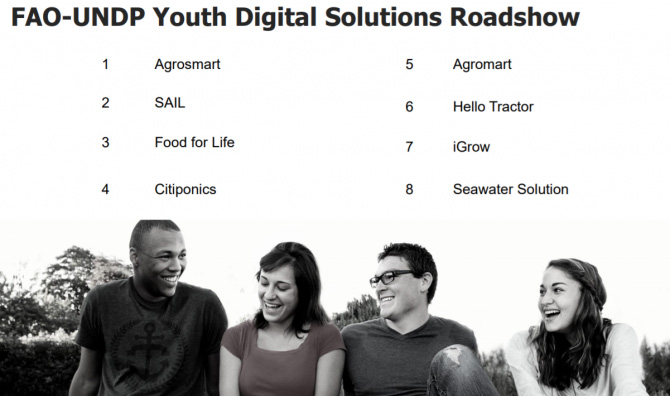FAO and UNDP host the first virtual Digital Innovation Dialogue on Youth Digital Innovation Solutions for Food and Agriculture

The 9th Session Digital Innovation Dialogue roadshows selected FAO innovation challenge winners and UNDP finalists of the Cultiv@te programme as teams pitch their solutions.
29 July 2020. Rome, Italy. The Food and Agriculture Organization in collaboration with UNDP Global Centre in Singapore hosted the first virtual Digital Innovation Dialogue on Youth Digital Innovation Solutions for Food and Agriculture online. The session presented a roadshow of eight teams selected from various challenges, for example, from FAO innovation challenge winners and UNDP finalists of the Cultiv@teprogramme. The teams included Agrosmart, SAIL, Food for Life, Citiponics, Agromart, Hello Tractor, iGrow and Seawater Solution; more 450 people registered for this session with 170 participating.
This 9th Session of the Digital Innovation Dialogue session was co-facilitated by FAO and UNDP Global Centre teams. Mr. Dejan Jakovljevic the CSI Deputy Director in FAO open up the session by introducing participants to the history, objective and evolution of the Digital Innovation Dialogues from the 1st to the present one. Mr Dejan, reiterated FAO commitment to digital solutions in agriculture and especially including the youth innovations in Food and Agriculture.
The session was co-chaired by Ms. Meng Zeng, Information Technology Officer, FAO and Mr. Armen Harutyunyan, Senior Advisor on Digital and Sustainable Agriculture, UNDP who introduced each teams to present. The chairs explained the purpose of the 9th digital innovation dialogue, which included the showcasing of technologies for smart farming, food loss and waste, decentralised agricultural machinery networks, urban farming and more.
The innovators teams walked through a roadshow of their solutions. The start-ups were grouped into five thematic groups, (i) Group 1: productivity and sustainable agriculture (Agrosmart & SAIL), (ii) Group 2: food loss and waste (Food for Life), (iii) Group 3: urban farming (Citiponics), and Group 4: services and knowledge sharing (Agromart, Hello Tractor and iGrow) and Group 5: agri-environment (Seawater Solutions).
For example, Agrosmart is a Brazilian start-up, presented the digital platform that collects data, processes it and delivers actionable insights, making data available across the food supply chain for a more climate resilient and sustainable agriculture. There were interesting questions after this presentation from the participants. The presentation by SAIL, winner of the 2018 FAO Land and Water Days Hackathon, focused on an innovative early warning system to predict droughts and floods using weather forecasting data and geo-spatial modelling.
Food for Life integrates blockchain, Internet of Things, and Artificial Intelligence technologies to solve the fundamental problems of food loss and waste in the process of the food supply chain. Citiponics ushered in their innovative urban agriculture solution, where in Singapore on top of apartment rooftops were turned into farms. Citiponics’ vertical farming solution, the Aqua-Organic System, is able to grow pesticide-free produce efficiently with zero-wastes, while using minimal energy and water.
For farming to proceed well agro-knowledge is essential, teams in Group 4: services and knowledge sharing, showcased their innovations in this aspect. Agromart, an Uzbekistan start-up, who address farmer-knowledge gap by providing advisory services to digitise farming practices, enabling access to suppliers, as well as to market. Crossing over to Africa, Nigeria, Hello Tractor address the shortages of farming equipment and at the same time collecting on farm data via their equipment. They provide technology for tractor owners to better manage their equipment while offering farmers an app to request services from our connected tractor fleet. Lastly, in Indonesia, iGrow addresses peer-to-peer lending, through connection between farmers, off takers and lenders to create a feasible farming supply chain.
In conclusion, in the Group 5: agri-environment, Seawater Solutions turns degraded and salinized land into healthy saltmarsh ecosystems, where food is grown in seawater. With rising seas and encroachment of coasts to arable land, Seawater Solutions can be up scaled in many affected areas in the world.There were lively discussion after each of the presentation, more than 160 participants expressed their gratitude and were active throughout the dialogue.
In concluding speech, Bradley Busetto, Director of Global Centre for Technology, Innovation, and Sustainable Development, UNDP thanked the collaboration between FAO and UNDP as an example of one-UN model of working together to solve the developmental challenge. He praised the teams for working tirelessly without any financial contribution yet they produced exciting models that are poised to solve the problems identified within the SDG framework. He further explained that the youth have the potential to use digital technologies in Food and Agriculture and also in other developmental challenge.



